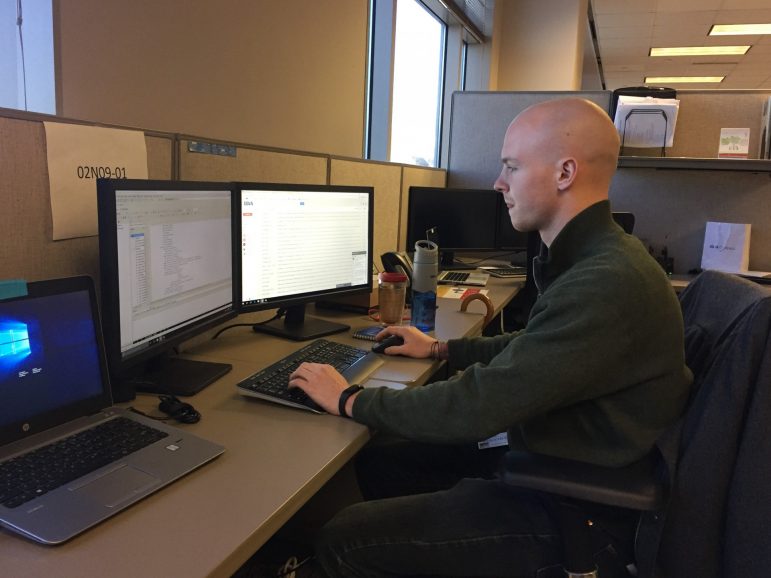The Greater Birmingham area has a high demand for skilled computer workers, but the workforce doesn’t come close to meeting that demand. The imbalance is so stark that in 2016, the U.S. Department of Labor put up almost $6 million dollars to train future IT workers. The result is an alliance called the Innovate Birmingham Workforce Development Partnership meant to strengthen the metro area’s economy.
It has a lot of moving parts, but it’s easier to understand Innovate Birmingham if you think of it as a bridge between area firms that need IT skills and workers who can now get those skills. Workers like Jake Downard, who says it changed his life.
He graduated from Innovate Birmingham’s third IT Boot Camp this winter. The former Marine says the 9-to-5, three-month program was intense. He did the IT training while he waited tables at night because he wanted a good job, but didn’t want to spend years getting it.
“I wasn’t trying to wait until I was 26, 28 to start a career,” he says. “I have friends that have graduated college, and I would say maybe two of them have jobs in the field that they got a degree in, so organized education sometimes … isn’t for everybody.”
But Innovate Birmingham boot camps have given 70 workers like Jake a different track.
“We know that opportunity is not always distributed equally. We are connecting disconnected youth in the Birmingham area to jobs in technology,” UAB’s Abby Guerin, Innovate Birmingham’s Director of Workforce Development says.
UAB led a 15-member partnership that landed the federal grant to create Innovate Birmingham. The money is meant to prime the area’s tech-job pipeline by training more than 900 young workers by 2021. Many of them haven’t finished college.
“We are gearing towards under- and unemployed young people who maybe have started at university but haven’t had the means to graduate,” says Guerin.
Innovate Birmingham gives partial scholarships that combine with other financial aid to get students into Jeff State, Lawson State, and UAB IT programs. The Boot Camps are free, and according to Guerin, about 70 percent of those graduates have been hired.
UAB computer forensics researcher Gary Warner says that’s a start.
“There are so many jobs available right now in this space, but the supply and demand – we don’t need to be graduating 50 people a year at UAB in this space, we need to be graduating 500,” says Warner. “We have to change the way we’re thinking about the problem.”
Warner worries that all the training in the world won’t help local workers meet the demand if area school systems don’t improve students’ reading and math levels. But he’s in favor of programs that get trained workers into the market faster.
Abby Guerin predicts that’s exactly what’ll happen:
“I think what Innovate Birmingham will be doing five or 10 years from now is completely filling the workforce gap here in technology so that companies aren’t going to Atlanta or Nashville or Austin to hire. Young people [will] see opportunity here, and see a chance to get out of a dead-end job and change their lives and the lives of their children.”
Innovate Birmingham started with 27 partner firms where graduates could land. Now there are 50. And remember Jake Downard? As of December, he’s a systems programmer at BBVA Compass.
“I have an awesome, salary job. I have benefits, insurance. I’m not a server anymore,” he says with a laugh. “I’ve got vacation days. I can finally afford a one-bedroom apartment. It’s walking distance from the office, so everything’s just going really well.”

